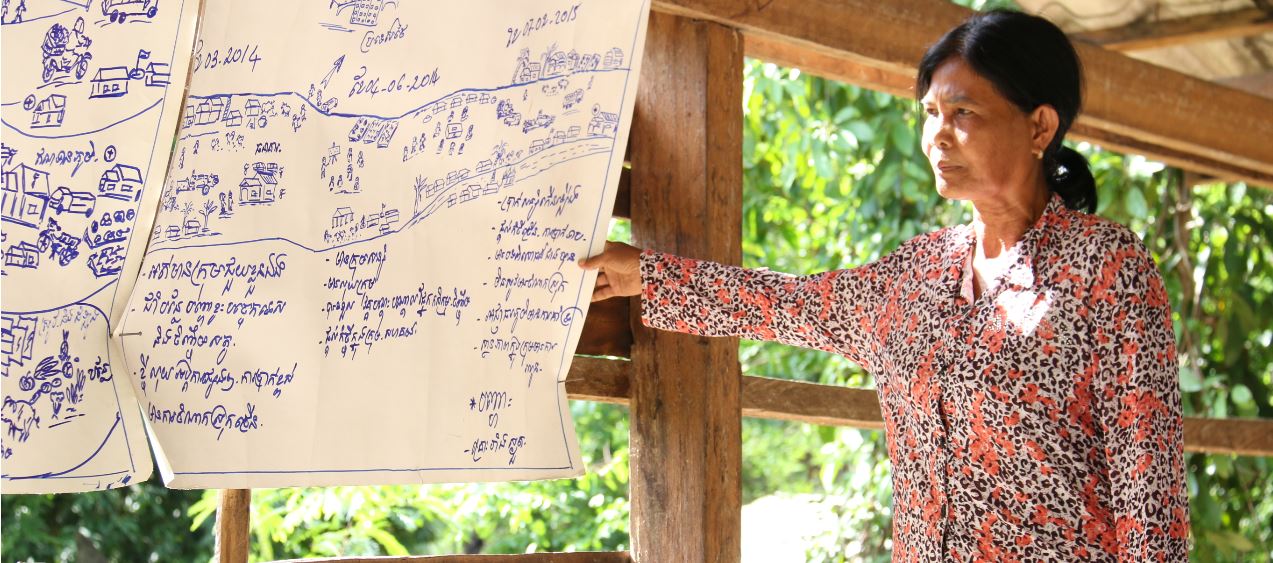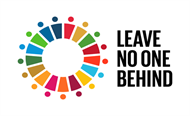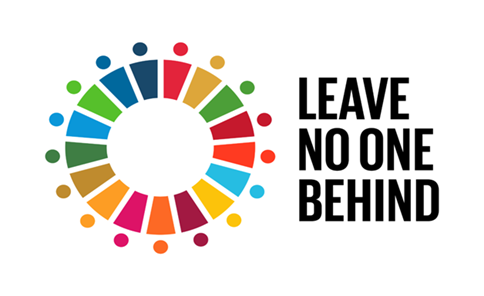Page Content
 Leave No One Behind (LNOB) - Inclusion & Exclusion
Leave No One Behind (LNOB) - Inclusion & Exclusion
 Leave no one behind (LNOB) is the central pledge of the 2030 Agenda, recognizing the need to combat poverty and inequalities. In fact, leaving no one behind is indispensable in order to meet the Sustainable Development Goals. Leave no one behind (LNOB) is the central pledge of the 2030 Agenda, recognizing the need to combat poverty and inequalities. In fact, leaving no one behind is indispensable in order to meet the Sustainable Development Goals.
For more information on LNOB, please visit the shareweb Poverty and Wellbeing (link on the right). ![]() 
Normative Documents
SDC
[1.2 MB]
This SDC guidance on leaving no one behind is a normative document for all SDC staff and replaces the SDC guiding note on poverty (2000).Part I clarifies the SDC’s position on leaving no one behind in the 2030 Agenda for Sustainable Development, and Part II provides support to the SDC staff and its partners on how to ensure implementation. This guidance elaborates on the first principle of mainstreaming the 2030 Agenda in Swiss International Cooperation: “Leave no one behind and reach the nations, peoples and segments of society furthest behind first.”
Working Aids
SDC
[347 kB]
Leave no one behind (LNOB) is the central pledge of the 2030 Agenda, recognizing the need to combat poverty and inequalities. In fact, leaving no one behind is indispensable in order to meet the Sustainable Development Goals. This working aid is dedicated to LNOB and IED featuring good practices and relevant links on the topic of LNOB - and is based on SDC's guidance for LNOB.
SDC
Education is integral to the inclusive, peaceful and sustained development of a society. If education is equitable and of good quality, it can ensure the participation of marginalised groups in the development process more broadly, thereby reducing social inequalities. Without attention paid to equitable access, learning opportunities and quality learning outcomes, education can entrench existing inequalities within societies. To create more inclusive and just societies, it is thus crucial to leave no one behind in education. In addition to the note on education, there is a general guidance as well as four other thematic Working Aids on Agriculture and Food Security, Employment & Income, Decentralisation & Local Governance, and Health.
Case Studies
Institution de microfinance TITEM, Project SAHA, Intercooperation
[153 kB]
L’étude se base sur l’expérience de SAHA, programme de développement rural financé par la Direction du Développement et de la Coopération (DDC) et mis en œuvre par Intercooperation à Madagascar. Elle a été réalisée par Intercooperation dans le cadre des études de cas du réseau thématique Emploi et Revenu de la DDC.
Réseau Alliance Santé, Benin
[622 kB]
Cette étude de cas est basée sur l’expérience d‘un programme de promotion de mutuelles de santé financé par la Direction du Développement et de la Coopération (DDC) et mis en œuvre jusqu’en 2007 par le Centre International de Développement et de Recherche (CIDR) et géré par la suite directement par le Réseau Alliance Santé (RAS). Elle a été réalisée conjointement par le CIDR, le (RAS) et le centre d’Appui aux Institutions de Micro assurance Santé (AIMS). En collaboration avec Radhid Aladji Boni Sylla, réseau alliance santé et D. Ismale Yacoubou, directeur de l’AIMS.
For more Information
-
Stephanie Guha
(GUS)
Program Manager Poverty & Wellbeing Network in SDC-Peace, Governance and Equality
Relevant News
-
29 May 2022
-
01 Nov 2019
-
10 Sep 2019
 29 May 2022
Social protection plays a central role to Leave No One Behind (LNOB) and to reach the Sustainable Development Goals (SDGs) of the 2030 Agenda. Social protection is a set of public and private initiatives designed to provide protection for all against social and economic risks across the life-cycle and ensure sustainable livelihoods. Well-designed social protection systems ensure a minimum income and equitable access to essential services for the poor and vulnerable, enable people to cope with shocks and ensure dignity, social cohesion and reduce (gender) inequality. A dedicated page of the network Poverty & Wellbeing provides an overview of SDC's learning and engagement in social protection and summarises the global debate and evidence in development as well as humanitarian contexts. For more information on LNOB and IED - go to page LNOB - Inclusion & Exclusion
 01 November 2019

Leave no one behind (LNOB) is the central pledge of the 2030 Agenda, recognizing the need to combat poverty and inequalities. In fact, LNOB is essential to meet the SDGs. SDC has elaborated a thematical working aid for e+i, additional to the SDC guidance on leaving no one behind, which is a normative document for all SDC staff. We will learn about the thematic working aid and how – based on practical examples – it supports e+i projects and programmes to translate LNOB into project design and implementation. Date: Tuesday, 26 Nov 2019, 11:00 – 12:00 Swiss time

About the speakers
%20in%20e+i_2019111814642662.jpg) Jodie Thorpe, Research Fellow in the Business Development Centre at the Institute for Development Studies (IDS) in the United Kingdom. She is an expert on inclusive market approaches, enterprise development, and public-private and multi-stakeholder partnerships. Jodie Thorpe, Research Fellow in the Business Development Centre at the Institute for Development Studies (IDS) in the United Kingdom. She is an expert on inclusive market approaches, enterprise development, and public-private and multi-stakeholder partnerships.
Jodie will introduce the thematic working aid on LNOB in e+i. Thereby she will present insights regarding the livelihoods of very marginalized men and women and how to make a good diagnosis of exclusion in the employment and income domain. She will also explore strategic entry points for programmes to expand the scope for marginalised women and men to use their agency to access markets, and to transform markets to better reach these groups.
%20in%20e+i_2019111814622983.jpg) Zenebe Uraguchi, Senior Advisor Market Systems Development and Programme Coordinator for East & Southeast Europe at HELVETAS Swiss Intercooperation in Switzerland. He is a development economist with multi-country experience. He holds MA degrees in International Relations and Political Economy as well as a PhD in Development Economics. His areas of expertise are in the design, management and evaluation of private, public and non-profit development initiatives focusing on employment and income. Zenebe Uraguchi, Senior Advisor Market Systems Development and Programme Coordinator for East & Southeast Europe at HELVETAS Swiss Intercooperation in Switzerland. He is a development economist with multi-country experience. He holds MA degrees in International Relations and Political Economy as well as a PhD in Development Economics. His areas of expertise are in the design, management and evaluation of private, public and non-profit development initiatives focusing on employment and income.
Zenebe will provide insight how a project in Bangladesh has challenged misconceptions about inclusiveness and which practical considerations are required to ensure inclusion of poor and disadvantaged women and men.
%20in%20e+i_201911181429300.jpg)
Kleidor Rustemi, Programme manager of Coaching for Employment and Entrepreneurship (C4EE) at Swisscontact Albania. Kleidor has over 20 years of experience in labor market, skills and social inclusion. In particular he focuses on topics like sustainable development and change of livelihood for marginalized categories. He has a degree in social work and is certified as trainer in coaching for employment methodology from University of Applied Sciences Lucerne, Switzerland. Kleidor will share his extensive experience how the program has supported young individuals, in particular from marginalized groups to increase their chances in the market through the application of the C4EE methodology.
 10 September 2019
Leave no one behind (LNOB) is the central pledge of the 2030 Agenda, recognizing the need to combat poverty and inequalities. In fact, LNOB is indispensable in order to meet the SDGs. SDC has elaborated a thematical working aid for e+i, additional to the SDC guidance on leaving no one behind, which is a normative document for all SDC staff. The working aid supports e+i projects and programmes to translate this aspect into project design and implementation from the very beginning on. We encourage you to look at the document. Stay tuned, a Webinar on this topic will be announced soon.
Relevant Events
17 Nov 2021
17 November 2021
17 November 2021
17 November

Following up on the recommendations of the independent evaluation of SDC’ s social protection performance, SDC offers an online learning on social protection for all interested staff. The training from June 2021 to August 2022 encompasses nine webinars and aims at creating a better understanding of social protection within SDC to integrate it more systematically in SDC’s work. While the first two modules generate a common understanding of the concept, instruments and impacts of social protection, the other seven modules will focus on social protection in various more technical contexts, including agriculture, food security, private sector, financial services, education and employment, health, triple nexus, governance, gender and social protection indicators. Please take especially note of the TECHNICAL MODULE 4: PRIVATE SECTOR DEVELOPMENT, FINANCIAL SERVICES, BASIC EDUCATION AND VOCATIONAL SKILLS DEVELOPMENT & SOCIAL PROTECTION WEDNESDAY, 17.11.2021, 09:30-11:30am (CET) online Social protection plays an important role in protecting people from life-cycle risks caused by loss of income or livelihoods. Social protection has also an important promotive function strengthening and sustaining productivity and livelihoods with a positive impact on economic development and growth. This is particularly strong when linked to complementary measures such as skills training or social services. In this module we will discuss some of these instruments in more detail, in particular in the context of informal employment and decent work. This also includes the role of social protection in improving access to education. Link to the presentation. >> more
26 Nov 2019
26 November 2019
26 November 2019
26 November

Leave no one behind (LNOB) is the central pledge of the 2030 Agenda, recognizing the need to combat poverty and inequalities. In fact, LNOB is essential to meet the SDGs. SDC has elaborated a thematical working aid for e+i, additional to the SDC guidance on leaving no one behind, which is a normative document for all SDC staff. We will learn about the thematic working aid and how – based on practical examples – it supports e+i projects and programmes to translate LNOB into project design and implementation. Date: Tuesday, 26 Nov 2019, 11:00 – 12:00 Swiss time.

About the speakers
%20in%20e+i_2019111173646325.jpg) Jodie Thorpe, Research Fellow at the Institute for Development Studies in the United Kingdom will introduce the thematic working aid on LNOB in e+i. Thereby she will present insights regarding the livelihoods of very marginalized men and women and how to make a good diagnosis of exclusion in the employment and income domain. She will also explore strategic entry points for programmes to expand the scope for marginalised women and men to use their agency to access markets, and to transform markets to better reach these groups. Jodie Thorpe, Research Fellow at the Institute for Development Studies in the United Kingdom will introduce the thematic working aid on LNOB in e+i. Thereby she will present insights regarding the livelihoods of very marginalized men and women and how to make a good diagnosis of exclusion in the employment and income domain. She will also explore strategic entry points for programmes to expand the scope for marginalised women and men to use their agency to access markets, and to transform markets to better reach these groups.
%20in%20e+i_2019111174221710.jpg) Zenebe Uraguchi, Senior Advisor Market Systems Development at HELVETAS Swiss Intercooperation in Switzerland will provide insight how a project in Bangladesh has challenged misconceptions about inclusiveness and which practical considerations are required to ensure inclusion of poor and disadvantaged women and men. Zenebe Uraguchi, Senior Advisor Market Systems Development at HELVETAS Swiss Intercooperation in Switzerland will provide insight how a project in Bangladesh has challenged misconceptions about inclusiveness and which practical considerations are required to ensure inclusion of poor and disadvantaged women and men.
%20in%20e+i_201911181429300.jpg)
Kleidor Rustemi, Programme manager of Coaching for Employment and Entrepreneurship (C4EE) at Swisscontact Albania. Kleidor has over 20 years of experience in labor market, skills and social inclusion. In particular he focuses on topics like sustainable development and change of livelihood for marginalized categories. He has a degree in social work and is certified as trainer in coaching for employment methodology from University of Applied Sciences Lucerne, Switzerland. Kleidor will share his extensive experience how the program has supported young individuals, in particular from marginalized groups to increase their chances in the market through the application of the C4EE methodology.
|
